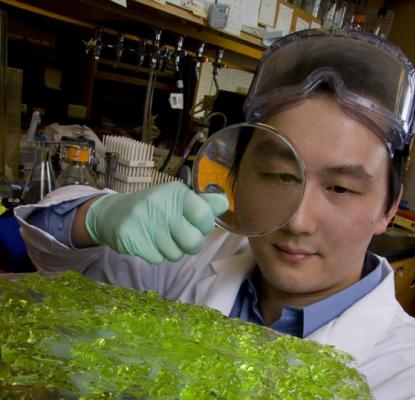Timothy Lu
Timothy Lu has invention embedded in his genes. However, Lu does not see himself as an inventor. According to Lu, “I see myself more as an engineer who is interested in a lot of different problems. When I identify a problem, I try to solve it any way I know how.” These traits exemplify the heart of inventiveness that is rewarded by the $30,000 Lemelson-MIT Student Prize, which Lu received in 2008.
Lu credits his “personal toolkit” with enabling him to tackle difficult problems. Inside his extraordinary toolkit are multi-disciplinary knowledge and experience in computer science, electrical engineering, and biology, plus a fearless attitude and an inventor mentor — his father, Nicky Lu.
During his youth, Lu was inspired by his father’s work and learned from him by visiting his office often. He witnessed the challenges and excitement that his father experienced as he started and built a company in Taiwan, which instilled a passion for entrepreneurship in Lu. He has also been inspired by his father’s continuous efforts to publish papers and thus, remain active in academia. Lu strives to emulate just that: a strong academic and successful industrialist and entrepreneur. Lu’s driving force for invention is his interest and enjoyment in problem solving, which he attributes to his father, who has always encouraged him to seek important problems, whatever they are.
From this project transcended his interest and enrollment in the Harvard-MIT Division of Health Sciences and Technology (HST). One HST course afforded Lu the opportunity to make rotations at a veteran’s hospital, which exposed him to the prevalence of chronic infections among patients. These preventable but deadly afflictions concerned Lu and precipitated his career pursuit in synthetic biology to solve these healthcare problems.
With his advisor Jim Collins, a Howard Hughes Medical Institute Professor in biomedical engineering at Boston University, Lu has invented a series of bacteriophage platforms that offer more effective and enhanced treatment, which promise to penetrate defenses of antibiotic-resistant bacteria and bacterial biofilms in order to combat infections. In addition, Lu’s antibacterial platforms can be quickly and inexpensively designed. They can be produced to thwart infections from bacteria that breed on a multitude of surfaces, including medical, industrial and food-processing equipment.
At this time, Lu is pursuing his MD from the Harvard-MIT Division of Health Sciences and Technology; he earned his PhD in medical engineering and medical physics in early 2008. He is currently working on the development of a gene sensor to detect certain genes inside a cell and decipher whether or not a cell is antibiotic resistant. By highlighting these cells, corrective steps could be taken.
Persistence is the hallmark of Lu’s inventiveness and research efforts as a synthetic biologist. “My personal philosophy is to never give up on things,” said Lu. “Even if an idea doesn't work initially, I believe in keeping it on the back burner, letting it fester in your mind, and revisiting it with a fresh approach and renewed energy.”


